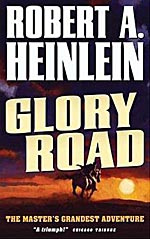
![]() couchtomoon
couchtomoon
5/20/2014
![]()
"ARE YOU A COWARD? This is not for you..."
After a Heinleinesque sojourn with my last read, I felt compelled to pick up a real Heinlein novel. Having read a couple of his earlier scifi novels, which were okay and a bit bizarre, I've been intrigued by his mid-career forays into the fantasy subgenre. Fantasy is already filled with enough heaving breasts and rigid codpieces, Heinlein's sexism should have a field day. I wondered what that would look like.
Once upon a discharge from a vague sixties war, E. C. Gordon tolls around the French Mediterranean, checking out the naked chicks while waiting to cash in on his G. I. Bill. He spies a personal ad promising adventure, danger, and high pay to any weapons proficient young man. Upon inquiry, he meets a beautiful woman named Star who whisks him magically away to an alternate world where magic, chivalry, and medievalism rule. E. C. (now called Oscar), Star, and her manservant Rufo engage in many battles against evil, and eventually recapture the Egg of the Phoenix that saves the universe, or Star's world, or something like that.
The first few chapters extol the glories of French nude beaches. The next few chapters detail Star's naked jaunts while she rests, bathes, and models her naughty clothes for Oscar. There are a few pages dedicated to sorting and choosing manly weapons for a quest. This is humdrum Heinlein.
But then we also get blurby Heinlein, which is probably the only Heinlein I actually enjoy. The man always posits potent quotables which, agree with them or not, sound catchy. "Military policy is like cancer: Nobody knows where it comes from but it can't be ignored" (p. 20). "I was as famous a poet as I was a hero (Which was true. Zero equals zero)..." (p. 75). "But a democratic government is okay, as long as it doesn't work" (p. 277). Most of the stuff he says is too good ol' boy for me, but I appreciate the way he says it.
But Heinlein doesn't play with style. Glory Road carries on his trademarked first-person tale-telling, full of interjected Heinleinisms, gruff language, and his own voice. In any novel, first-person narration limits the scope and demands less of the writer, but Heinlein doesn't care. He is his protagonists, and it works for his books. It's no wonder that fanboys drool over his novels and troll the web for critics– Heinlein's arrogant confidence attracts the insecure geeks who are too scared to play D&D with the computer science club, but they still want to get laid by the cosplay girls. (Neocon nerds deserve to dream of sexually liberated elfin ladies, too!)
The story itself is pretty blah-worthy, but I think that's done on purpose. None of the adventures make much sense in the grand scheme of things, the evildoers are evil (because evil), and the revelation that a cyberegg will rescue the universe from some vague threat feels like a joke. Supported by pedestrian references to Alice in Wonderland and Wizard of Oz, it feels like Glory Road is less like serious fantasy and more like serious trope inversion.
Beyond that, the story serves only as a platform for Heinlein's societal experiments, which are mostly inspired by his frustration at sexual mores and the women's liberation movement. Always contradictory, Heinlein (again) imagines a world where male/female sexual relationships are relaxed, but traditional gender roles are reinforced. Star is friendly, intelligent, hyperfeminine, and submissive, while Oscar is stolid but clever, confident, acceptably masculine, and in charge. Sometimes, he just has to put his foot down when Star starts her nagging! But Star enjoys her sexuality and supports Oscar's sexual interests in other women (although he is much too secure to sleep around without her prodding). By the end, we learn that Star is an ancient Wisdom of the galaxy, upon whom the survival of the universe depends, yet she takes regular aging treatments to maintain her youthful skin and perky breasts.
But the story doesn't end at the end. Instead, the tale goes on for several chapters beyond the glorious victory, in order to explore Oscar's post-adventure devolution from hero to bored househusband. Oscar finds himself married to Star, a career Wisdom whose importance to the universe vastly overshadows his own. He dabbles in hobbies only to realize that he misses his adventures and resents his wife's success. After some soul-searching, Oscar returns to Earth, still lost and unhappy, until he reunites with Rufo and they reembark on the Glory Road.
For a fantasy story, Glory Road is fairly lame and dull, even when viewed as a playful inversion. But, when viewed as a portrait of the traditionalist male struggle in a changing society, where he embraces the sexual revolution (only to find it's not exactly what he wants), yet resents the kitchen revolution (although he kind of admires it), this is a rather insightful read.
Heinlein did this on purpose. This isn't a 300-page Freudian slip.
But when you close the book convinced that Glory Road has got to be a euphemism for a sex act, you have to wonder...
http://couchtomoon.wordpress.com